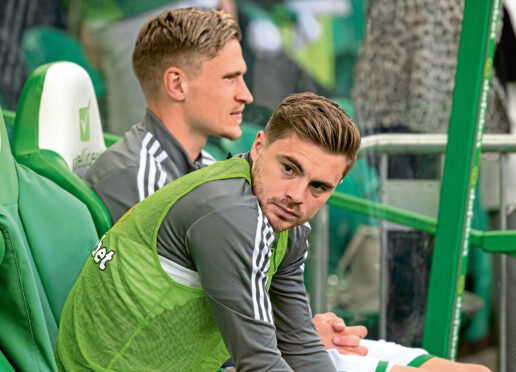
While Scotland were playing Ukraine and the Republic of Ireland over the past few days, the domestic game’s most-decorated player was conspicuous by his absence.
With 10 title triumphs, plus a full handful of both Scottish Cup and League Cup successes to his credit, James Forrest has collected an incredible haul of 20 winners’ medals.
The Celtic winger, a one-club man throughout his career, has been voted the Young Player of the Year and – in 2019 – both the Player of the Year and the International Player of the Year.
His hat-trick against Israel booked Scotland’s place in the play-offs for Euro 2020 and, by extension, helped end the long wait to get back to a major Finals.
However, so complete has his exit from the limelight been, the question: “Why is Forrest not involved?” could easily have been mistaken as a query about his younger brother, Alan.
He has been playing and scoring regularly for Hearts.
By contrast, the way to spot James these days is by waiting for the television cameras to pan their way along the Celtic bench.
He was an unused sub in the recent Old Firm clash, and did not make it on to the pitch either when Real Madrid came to town.
Hoops boss, Ange Postecoglou, made five attacking substitutions against St Mirren last weekend as he attempted in vain to reverse a losing scenario.
Jota, Haksabanovic, Giakoumakis, Matt O’Riley and Hatate were all introduced into then action as would-be saviours. But not James Forrest.
While he scored after coming off the bench in the 4-1 League Cup win at Ross County at the end of August, he has not featured at all since.
The club and player appear more than comfortable with the situation.
Celtic announced the 31-year-old had signed a new, three-year deal the day after they won the title last season – a clear evidence of commitment from both parties.
The manager has stressed both what a great guy Forrest is, and the important role he has to play in building and maintaining the right culture at the club.
He always appears on the bench, and the sight of him cheerfully warming up with the other subs points to the player not being the type to batter down the Australian’s door, demanding he get a start – or else.
The issue for Scotland is that it effectively robs national coach Steve Clarke of the services of one of his best and most-experienced attacking options.
True, he could have picked the winger when naming his squad for the Nations League triple header.
There is precedent. Alan Hutton made repeated appearances for Scotland at a time when he could not get a sniff of a game for Tottenham.
But to do likewise in Forrest’s situation would have made no sense.
Hutton got games because there was a shortage of viable options at right-back. Right now, Clarke is not so strapped for choice in the forward areas.
And for all Forrest has done for his country, picking him would have risked alienating those players who have been pushing to break into the squad. Players much like Alan Forrest, in fact.
Unless something changes, it is the 26-year-old sibling who has the better shot at getting to pull on a Scotland jersey, especially if his partnership at Tynecastle with Lawrence Shankland continues to develop.
The Scottish game possesses a seemingly-limitless capacity to deliver twists and turns.
But given the importance of Jota and Liel Abada to Celtic’s approach – and Postecoglou’s delight at landing Haksabanovic – this one would take a bit of scripting.
With the man at the centre of it all apparently contented and well-paid, his exit from international football would not be one of the great tragedies.
It would, however, be a shame were the player that former SFA Performance Director, Mark Wotte, once called “the light in the darkness of Scottish football” became such an inconspicuous presence in the game that he hardly shines at all.

Enjoy the convenience of having The Sunday Post delivered as a digital ePaper straight to your smartphone, tablet or computer.
Subscribe for only £5.49 a month and enjoy all the benefits of the printed paper as a digital replica.
Subscribe